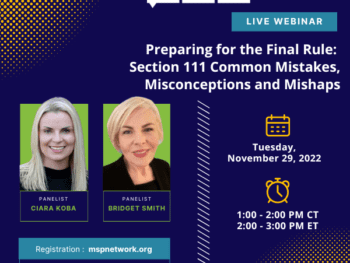
We can most likely expect states to ramp up their reimbursement efforts for affected workers’ compensation claims. It means if you haven’t paid much attention to Medicaid’s secondary payer recovery rights, it’s time to start.
Click Link to Access Free PDF Download
“8 ‘Think Outside the Box’ Tactics to Settle Workers’ Comp Claims”
Medicaid
Similar to Medicare, Medicaid provides healthcare to certain Americans. But unlike Medicare, Medicaid involves both the federal and state governments — think workers’ compensation with some federal oversight.
Here are some of the specifics of Medicaid:
- Expansion. It was created by Congress to provide healthcare to the disabled and those living in poverty, but was expanded under the Patient Protection and Affordable Care Act. Just about anyone under 65 who has a household income under 133 percent of the federal poverty level is now eligible.
- Quasi-federal/state program. States administer eligibility and claims processing functions, while the federal Centers for Medicare & Medicaid Services (CMS) oversees state compliance with federal Medicaid rules.
- Voluntary. The voluntary program allows states to determine how to address the needs of their own populations; but they must adhere to rules established by CMS in order to receive some federal funding for the program.
- Needs based. Unlike Medicare, which is an entitlement program generally available to anyone over 65 and/or disabled, Medicaid is based on a person’s income level.
Secondary payer
Like Medicare, Medicaid is designed to be the payer of last resort and its interests are supposed to be considered in settlements. However, court decisions over the years have limited reimbursement to only the amount designated for medical care, something not typically identified in workers’ compensation claims. That’s made it more difficult for states to go after settlement money. Until now.
The October 1 change allows Medicaid programs to go after the entire settlement of program beneficiaries. Just as Medicare has the right to recover conditional payments made from settlement amounts, Medicaid will likewise impact claims resolution. In fact, one of the federal government’s Medicaid requirements has been for states to seek reimbursement from third party sources. The October 1 change simplified that process — at least, for Medicaid agencies.
Workers’ Compensation
Because Medicaid programs are administered by states, every jurisdiction has a different set of laws and regulations — similar to workers’ compensation; and Medicaid recovery rules also vary from state to state. That fact complicates the situation for employers that operate in multiple states, as they try to determine Medicaid’s rights of recovery.
What the change will mean for workers’ compensation is something of a mystery at this point, at least in terms of the specific steps to consider Medicaid’s interests in settlements. Many questions need to be answered, such as reporting requirements, compliance and repayment.
One issue that further complicates things is the fact that recovery for Medicare and Medicaid are not mutually exclusive; each must be considered at settlement. Estimates are that roughly 20 percent of Medicare beneficiaries also collect benefits from Medicaid programs.
In anticipation of the rule change, states began the process of implementing strategies to identify Medicaid beneficiaries who receive workers’ compensation. Many state Medicaid agencies have implemented reporting requirements through data exchange programs and registries.
Rhode Island, for example, established the Medical Assistance Intercept System and requires all insurers operating in the state to participate. The program electronically matches Medicaid recipients with liability and workers’ compensation insurance claims. It is designed to intercept payments of $500 or more for reimbursement to the state’s Medicaid program.
What to Do
- Proactively monitor developments. Watch for CMS guidance, for example to understand how best to comply with reporting requirements and compliance.
- Understand state laws. It’s important to stay abreast of Medicaid recovery statutes and case law in each jurisdiction in which you do business, since each one has a unique system.
- Identify Medicaid beneficiaries and those who will be, among your claimants, and report them to your state’s Medicaid agency.
- Don’t forget Medicare. The rule change for Medicaid has no bearing on Medicare, so procedures for considering its interests should remain the same.
- Carefully read any correspondence you receive from CMS and/or state Medicaid agencies.
- Adopt best practices. Work with your attorney(s), carrier and claims managers to develop a plan to consider Medicaid’s interests in claims.
Conclusion
Medicaid has always been a payer of last resort when other sources of funding are involved. The change in language as of October 1 will likely lead states to become more aggressive in seeking recovery in claims involving Medicaid beneficiaries. It’s important to stay up to date on the very latest developments to ensure you are in full compliance.

Contact: mstack@reduceyourworkerscomp.com.
Workers’ Comp Roundup Blog: https://blog.reduceyourworkerscomp.com/
©2017 Amaxx LLC. All rights reserved under International Copyright Law.
Do not use this information without independent verification. All state laws vary. You should consult with your insurance broker, attorney, or qualified professional.












